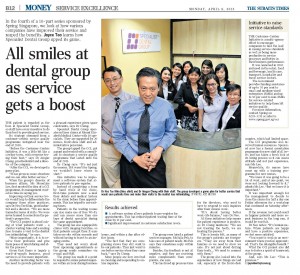 This article first appeared in the April 8, 2013 issue of the Straits Times. We have reproduced it for the information of those of you who missed it when it was published.
This article first appeared in the April 8, 2013 issue of the Straits Times. We have reproduced it for the information of those of you who missed it when it was published.
In the fourth of a 10-part series sponsored by Spring Singapore, we look at how various companies have improved their service and reaped the benefits. Joyce Teo learns how Specialist Dental Group upped its game.
The patient is regarded as the boss at Specialist Dental Group, so staff have every incentive to do their best to provide good service.
Its strategy stemmed from a customer-centric service quality programme instigated near the end of 2010.
“Before the Customer-Centric Initiative, it was a little bit like a cowboy town, with everyone trying their best,” says Dr Ansgar Cheng, prosthodontist and director of the company.
“After the CCI, we developed a game plan.
“It has given us more structure and we can offer better service.”
When the group’s director of business affairs, Ms Moonlake Lee, first mooted the idea of a CCI programme, its management wasted no time in saying yes.
Improving on their service levels would help to differentiate the company from other practices, says Dr Neo Tee Khin, prosthodontist and a director. “We are more trained in terms of skills. We were never trained to come from the patient’s perspective.
“The CCI project is about looking at what patients want – a shorter waiting time and a smiling face to make a visit to the dentist less intimidating,” he says.
“More importantly, it is to resolve their problems and give them peace of mind during and after the process.”
Given that theirs is largely a word-of-mouth business, good service is all the more important.
Another motivating factor was the need to provide patients with a pleasant experience give space constraints, says Dr Cheng.
Specialist Dental Group operates in three clinic at Mount Elizabeth Medical Centre with 10 specialists. They are supported by 20 nurses, front-desk staff and administrative personnel.
The group tapped the CCI, got a grant and worked with a consultant to structure a service quality programme that lasted until the end of 2011.
Dr Cheng says: “It’s not just the money. If it wasn’t for Spring, we wouldn’t know where to start.”
One initiative was to implement a software system that allows patients to pre-register.
Instead of completing a form by hand while at the clinic, first-time patients now e-mail their details and medical history to the clinic before their appointments. This has helped to cut waiting times.
Patients in the waiting rooms can also make use of free Wi-Fi, and can access more than one type of dental specialist during the same appointment.
The group has also equipped its clinics with imaging facilities, so that patients can get their X-rays taken on-site within seconds and without having to travel to an imaging centre.
They need not worry about their upcoming appointments as the groups sends reminders via e-mail and SMS.
The group has also made it a point to respond to online patient inquiries within an hour during business hours, and within a day after office hours.
“The fact that they are complaining shows they still want to be our patients. They just want to see better service when they come back,” says Dr Cheng.
More people are now involved in checking and responding to online inquiries.
They group even hired a patient services manager, Ms Julia Peh, to take care of patient needs. Ms Peh says sometimes they reply within minutes.
Besides, the feedback is not all negative, and they are receiving more compliments than complaints, she says.
This has freed up precious time for the directors, who used to have to respond to such inquiries after their clinical work.
“It’s about having better work-life balance,” says Dr Neo.
All these initiatives help ensure the patient experience is positive. As Dr Cheng mentions: “We are not treating the teeth, we are treating the person.”
This is keenly felt, as many of the group’s patients are foreigners. “They are away from their families so we need to show we care. It’s not just about drilling their teeth… We need to connect with them.”
The group also looked into the ergonomics of how things are laid out, especially at the front-desk counter, which had limited space.
The CCI programme also involved human resources. Specialist now has a formal orientation programme for new staff of all levels and has taken a fresh look at its hiring process so it can access attitude and not just experience, says Ms Lee.
Meanwhile, its nurses have come up with a training programme for new nurses.
“We knew it was going to be a lot of work, and at one point, we were not looking forward to it,” admits Ms Lee. “But we know it is important.”
It was important enough for the management to decide to close the clinics for half a day one Friday afternoon for a workshop that continued on Saturday afternoon.
If the revenue lost could result in happier patients and more repeat business in the long run, it would be worth it.
Dr Neo notes: “It’s a human nature. When patients are happy and have a positive experience, we feel more satisfied.
“You want to work in an environment where you feel appreciated. That’s the intangible benefit.”
What the CCI project also did was to foster a spirit of teamwork at the group.
And, says Ms Lee: “This is priceless.”
Source: Straits Times © Singapore Press Holdings Limited. Reproduced with permission





